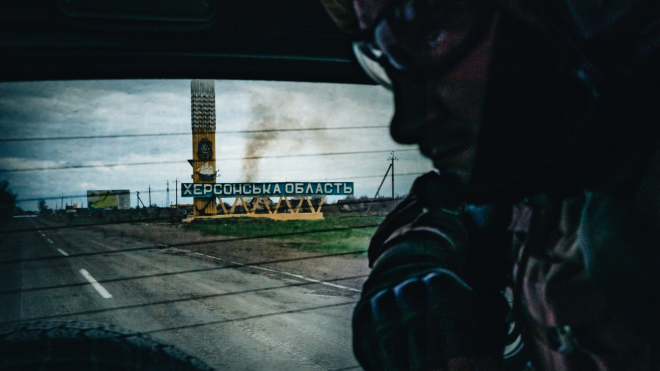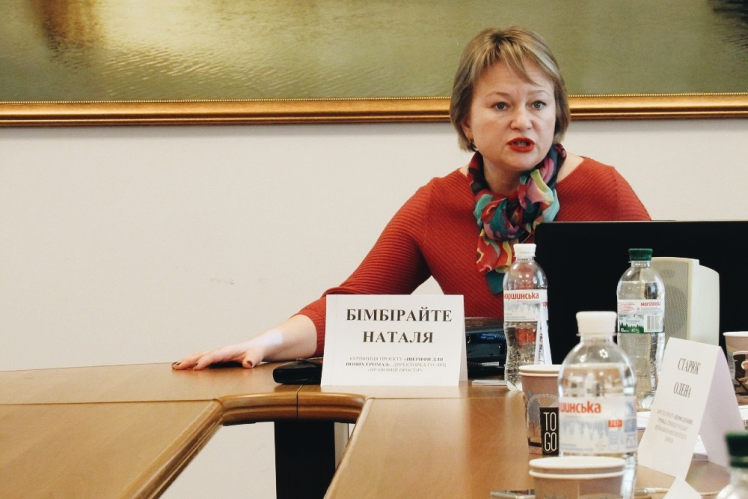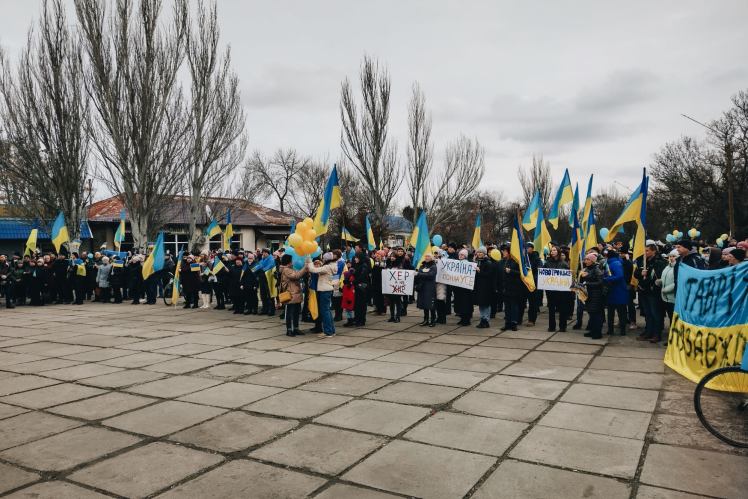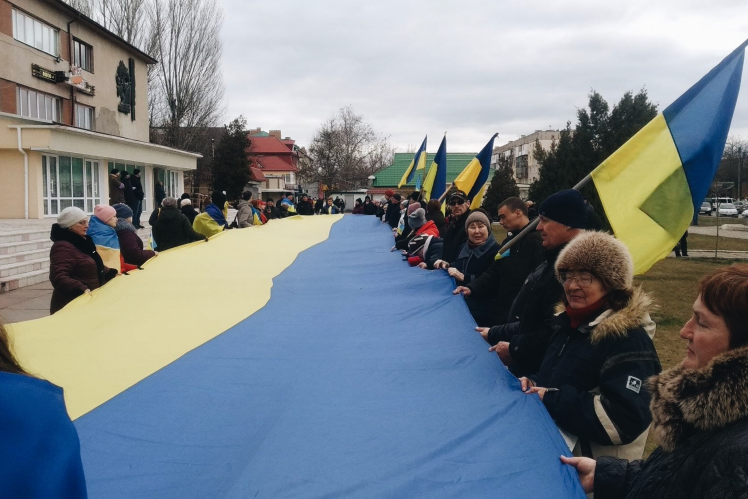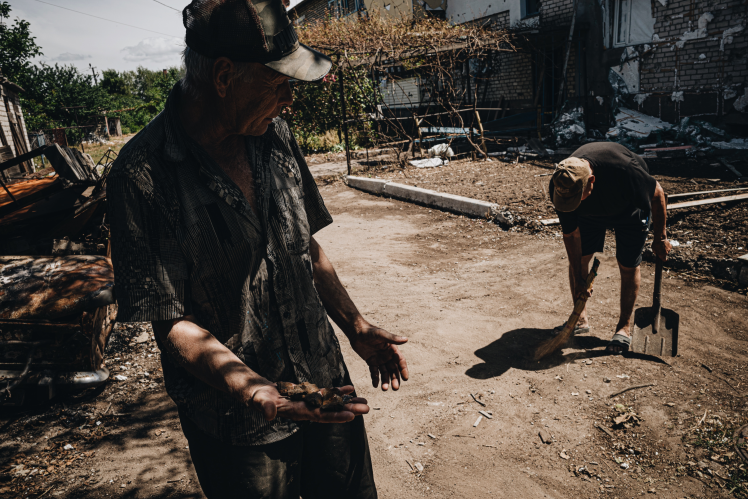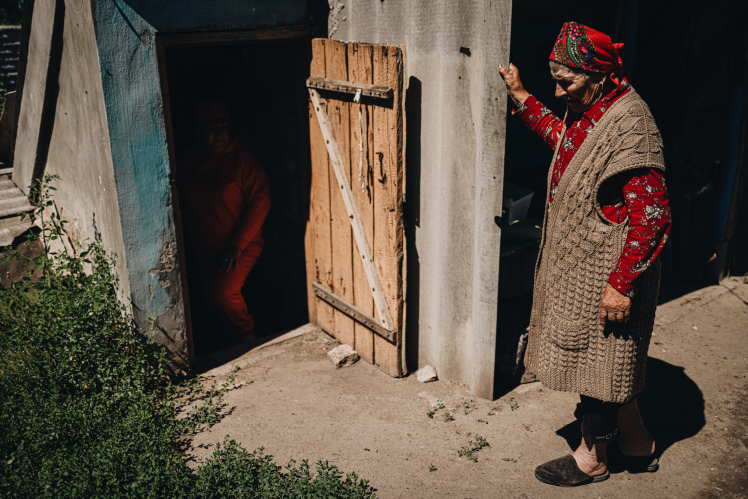I am from Kherson, engaged in human rights protection and journalistic investigations. Therefore, I know the local people, many representatives of local authorities and communities so good. I also monitor social networks and mass media that I trust or people which I know personally. In addition, people turn to me for help. These are my sources.
Natalia Bimbiraite.
prostir.ua / «Бабель»
The terror of the Russians in the Kherson region changed during these six months — at first they acted with soft "Crimean" methods. People in Kherson and large cities of the region — in Skadovsk, Chaplinka, Nova Kakhovka and others — went to pro-Ukrainian rallies and demanded to return home from Russians in the first days of March. First time, the Russians were confused, because they did not expect resistance. They really thought that they would almost be greeted with flowers. The occupiers tried to bribe the population — for example, they distributed humanitarian aid. When this did not work, they began to disperse the strikes with stun grenades, tear gas. They beat civilians. This tactic was used in all cities. The occupiers filmed people at rallies. There were Russians disguised as civilians among the protesters. People were tracked when they went home, someone was detained just at the rally. People were taken away, severely beaten and released for the first times. They managed to suppress mass protests and rallies.
Rally in Novotroitsky, Kherson region, March 7, 2022 Rally in Kakhovka, Kherson region, March 7, 2022.
Трудова Слава / Facebook / «Бабель»
Then the partisans work began, and the Russians became more brutal. Someone was released with knocked out teeth and broken ribs. Many people just disappeared, nothing is known about their fate. As of August, human rights defenders were aware of about 600 such cases. In fact, the number is much higher, because no one knows what is happening in the occupied villages. So, Kherson is a big city. Before the war, 300 000 people lived there. A half of them managed to leave, but the other half stayed there.
I see reports of vanishing every day. Public activist Victoria Karpova was recently kidnapped. She is 55 years old. Russian soldiers came to the house and took her away. Her daughter has already passed all the "commandant offices". This is basically how they look for people — on social networks, in morgues and hospitals, in the centers of the occupying authority.
People disappear in different ways. For example, a man said that he went on business, and then called his wife, asked to pick up the child, anв did not answer anymore. Although he appears online. The woman starts looking for him. The occupiers react to this in different ways — from indifference to "go home, because it will be worse for you." It would do nothing. The Russians, who kidnap people, do not have identification marks, do not introduce themselves. Moreover, they are dressed in civilian clothes. If you asked to name themselves, they always answer "you donʼt need to know that."
Victoria Karpova, kidnapped on September 2, 2022.
Світлана Гаврилів / «Бабель»
Kidnapped people are kept in administrative buildings. When the Russians came to Kherson, they took over everything — the city council, the regional administration, the regional police department, the SSU, all district police departments, pre-trial detention centers, prisons, a former sober house, and the television and radio company. The last one was converted to Russian waves in May. These places are also used as prisons. In the villages, these are also administrative buildings, farmersʼ hangars, and ordinary houses. From the testimonies I wrote down, it is known that in March people were detained mainly in the regional administration building. Womenʼs screams were heard from the offices there.
Collaborators leaked the addresses of soldiers, law enforcement officers, public figures and journalists. The occupiers took these people on purpose. If they opened the door immediately, the Russians tried to be "polite" at first, but if not — they kicked the door out. The members of Territorial Defence Forces were lured. Then people were found tortured — like Vitaliy Lapchuk. On June 9, he was found drowned with weights on his legs. Traces of torture were found on the body.
The occupiers are taking away elders and heads of self-government in the region. More than 30 people were detained. Some of them have not been released to this day. For example, since March we havenʼt heard anything about Oleksandr Babych, the mayor of Hola Prystan. One of the first people we managed to take out of the occupation was Viktor Marunyak, the headman of Stara Zburivka. He was taken away on the day of his 60th birthday. He was tortured for three weeks with electric shockers, beaten and doused with cold water. Viktor was released on condition that he becomes a collaborator, but he left the region. He has nine broken ribs, bruises, hematomas, wounds, which he is treating to this day. For now he is abroad.
Oleksandr Babych (left).
Олександр Бабич / «Бабель»
The Russians interrogate people in a chaotic manner. They ask questions in a circle, pass people on to other occupiers, and donʼt write down their testimony. Those who were taken away from the rallies were asked who organized these protests and who paid for them. It was such terror and intimidation that people were just afraid to resist. Village heads, elders and mayors were accused of leading "networks of the sabotage and reconnaisance groups" and demanded to give their names and addresses. Public activists were also kidnapped for intimidation or recruitment. They were beaten and tortured in inhumane conditions, kept without food. And when people were destroyed, Russians recorded videos for propaganda outlets about the fact that they allegedly “have no complaints against the Russians”, or about "confessions" in terrorist activities. They were called "agents" and "Sorosists" (people supported by the American billionaire and philantropist George Soros) and demanded to write defamatory information on specific people.
Tatiana, a journalist, survived probable war crimes committed by Russian soldiers in Kherson.
Getty Images / «Babel'»
The Russians began to put pressure on educators, doctors, and parents of school-aged children in the summer. The Russians want teachers and doctors to cooperate with them. So, they offered them "retraining courses", but still cannot recruit enough collaborators. In the occupied territories, the Russians canʼt establish anything. Neither self-government, nor the education system, nor the communal sphere. There are not enough supporters of the "Russian world" in any field. Female teachers were pressured using- their husbands or adult children. Family members were kidnapped, beaten and released on condition if the women agreed to work for the Russians. The doctors were required to sign an “agreement on cooperation” on condition that they would resign as soon as the Russian doctors arrived here. As the school year starts, the pressure on parents rises. They are threatened to be deprived of their parental rightsif their [children] donʼt go to the occupiersʼ schools. Sometimes they issue fines, sometimes they actually “deprive” of parental rights. But I donʼt know any case, when after such pressure, people agree to work for the occupiers. After such threats, they [people] mostly try to leave, although not everyone can do it. The occupiers immediately began to put pressure on entrepreneurs and farmers. The Rushists (local naming of the occupiers, sounds common to "fascists") took away their cars, machinery, premises and products. The farmers were forced to pay "taxes" in cash in the summer.
Read more:
I know cases when people could not stand the pressure and died. This happened to my friend, anesthesiologist Daliy Stashenko. His heart gave up, and he died at the age of 59. He could not leave the patients and remained in Kherson. He was such a kind man, he saved many lives.
Itʼs easier to get lost in Kherson, but in the village everyone knows everyone. Everything is at a glance. That is why itʼs more terrible there. The occupiers behave more arrogantly in the villages. Their methods are the same — kidnapping, torturing, intimidation. They enter wherever they want, you just canʼt not let them in. If a collaborator points on someone, [this person] is taken away. But no one knows for sure what is happening in the villages. It is known about marauding and raping. They raped everyone, regardless of age ― from little girls to an 80-year-old woman in the Novovorontsovka community. These cases are documented. People from villages that are still occupied are afraid to speak. We can know about what is happening there only if the locals talked to each other and then someone passed on this information to others.
Mykola Kostitsyn shows fragments from projectile bursts. Mykhailo Haydamaka sweeps away the debris after the shelling for no one to get hurt. Kherson region, June 25, 2022 86-year-old Anastasia Bilyk and her 59-year-old daughter Lyudmyla Denysenko near the entrance to the basement, where they usually hide during shelling. Kherson region, June 25, 2022.
Getty Images / «Babel'»
The closer to the front line, the more people who remain there suffer. They live under shelling, without light, water, gas, food and medicine. When people leave those villages, we see that they were starving. When I myself left after a month of living in the occupation and went into the store, I felt both surprise and joy at the fact that there was everything. And these people are surprised by any little thing — the fact that you can just drink coffee, for example. The volunteers are asked by these people several times whether it is really possible to take one more candy and if there is really enough of them for everyone. They just cry because of this.
Mykola Mosura stands near his recently shelled house. Kherson region, June 25, 2022.
Getty Images / «Babel'»
We record crimes committed by Russians and even find those who commit it in the occupied territory. But this work is not public.
Translated from Ukrainian by Ruslana Stolz.
Every crime of the Russians will be punished, and Babel will write about it. We will document even more crimes if you support us: Patreon 🔸 [email protected]🔸donate in cryptocurrency🔸in hryvnia.
